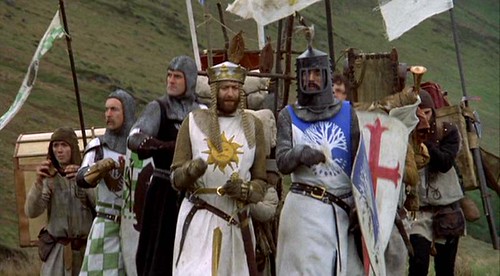
Last September, I made the largest single monetary investment of my life in my own education as a coach and trainer - I participated in Pavel Tsatsouline's
Russian Kettlebell Challenge Instructor Certification Course. It did not disappoint.
The RKC was, far and away,
the best teacher/coaching training I have
ever gone through (and, as a teacher and coach, I've been through PLENTY of training, trust me). There was great instruction in basic skills, amazing modeling of effective teaching, and plenty of practice instructing and giving feedback to others. Think about how many PT certifications require ZERO time under the barbell - there are more than you might think. Think about how many coaching certifications actually require that you be able instruct a real live person - they are few and far between. Think about how many require nothing more than paying a fee and taking a paper test - most of them, actually. Consider these things and you might begin to appreciate how far ahead of the curve the RKC program truly is.
I wrote the following training log entry the day after completing the course - I hope you enjoy it and please post your thoughts and reactions.
The RKCThis past weekend, I took part in the RKC (Russian Kettlebell Challenge) Instructor certification course held in St. Paul, Minnesota and run by Pavel Tsatsouline, the man responsible for popularizing kettlebell training in the U.S., and John DuCane of DragonDoor Publications.
I’d like to say that I wowed Pavel and the others with my performance, but that would be lying.
DAY 1I started out the certification on Day 1 with a weigh-in and (of the 64 with one-arm switch required for my weight class) only getting 54 reps with the 53lb kettlebell. My excuse for the sub-par performance was a horrible cold that lingered ALL weekend and no warm-up.
Following the snatch test were Qigong exercises, an overview and practice of swings, a lecture on sport-specific training, get-ups, cleans, presses, snatches, and squats, a ladder workout with total of 200 swings, lunch, the “Beast Challenge” (for volunteers), more swings and troubleshooting potential form issues, the get-up and RKC arm-bar and troubleshooting, a lecture on tension, and a workout of continuous swings and get-ups for 10:00.
The day started at 8:30 sharp and ended at about 7pm. Pavel was actually not there at all on Day 1 – he was tied up in jury duty! Brett Jones, Sr. RKC, was head instructor for the day and I enjoyed it thoroughly even though I couldn’t wait to meet Pavel.
 DAY 2
DAY 2Day 2 started much like Day 1 – 61 snatches in another attempt to pass my snatch test. I had warmed-up this time, but when the grip goes, it goes fast – I felt totally fine until about two reps from dropping it.
At 8:45am, we had another Qigong exercise, followed by the clean and troubleshooting, a lecture/demonstration/practice of/on mastery of tension and relaxation, the press and troubleshooting, a lecture on deconditioned clientele, a press workout, group photo, lunch, snatch and troubleshooting, a snatch and “wheelbarrow” workout (“CrossFit Philly-style”), the front squat and troubleshooting, a lecture on the RKC community, team practice of drills and corrections, a workout combining all six exercises.
One guy, I named "Big John" (about 6'3", 330 and solid) was in back spasms on the field from the wheelbarrows... good times. Day 2, overall, was a little less demanding than Day 1 - there were just less reps. The day ended at about 7pm.
DAY 3Day 3 started with a lecture on marketing from 8-10am. Prior to the lecture, I had a chance to talk to Pavel briefly and tell him that my father liked his books and thanked him for that.
At 10:30, I took the snatch test again - 63 snatches… My team leader said, if I wanted, I could make a fourth attempt – of course I would.
At 10:45, Qigong exercise, followed by technique testing and evaluations in our teams – no problems there.
At 11:30, a technique competition with representatives from each team, followed by participant evaluations, and then a short lecture on working with first-time clients and another attempt at my snatch test – 60 reps.
From 1300 to 1400, 100 members of the St. Paul community came to the recreation center for a free session with the RKCs-in-training. I worked with two - Dan, a chiropractor in his late 40s who was also a personal trainer, practiced with kettlebells, and had read all of Pavel’s books, and Pam, an out-of-shape, overweight mother of 4, with borderline hypertension… I was very proud of myself with this – I was able to give Dan some tips on his swings and get-ups and Pam was able to do a half-up by the end of the session. A 10-minute workout at the end left them both feeling tired but successful.
At 1420, we had our “graduation workout” – a 100+ yards of :30 swings (w. one 53lb kb) and :30 walking see-saw presses (one step – one press). I knew I was going to be in trouble as we farmers walked the distance – my grip was already shot from the 120 extra snatches… I started not looking at anything but the kettlebells – I didn’t want to see the distance. At about the 15 yard mark, I didn’t know if I would finish. By 30 yards, I was wheezing, trying to swallow just made me gag, and my swings were lucky if they hit navel height. At 60 yards, I was well towards the back of the pack. I recall seeing, through a haze of sweat and delirium, Pavel darting in and out of the graduates monitoring their form and probably offering "encouragment", but I couldn't hear much - everything sounded like it was far away. By 75 yards, I could tell just about everyone else had finished because there were a lot of people around me cheering me on – I could barely see or hear them, everything was a blur. By this point I was kiai-ing on every clean and every press. At about 85 yards, I knew I was going to finish and the kiai-ing was helping me breathe. I finished feeling stronger than I started.
Flow is a funny thing.

At the end, I was given a “Certificate of Attendance” – of course, I expected that. My team leader, Jason Brown, and assistants, Pete Diaz, and Bill Makowski, were complimentary and said that everything was excellent, but the snatch test would still have to be completed before the RKC Instructor’s Certificate would be awarded and I’d have it no other way (well, maybe).
Things finished at about 4pm – there was a Systema demonstration afterwards that I really wanted to see, but I needed to get back on the road and back to the wife and son. All in all, I’m proud of my performance – disappointed, but I learned a lot and met some great people. I bought some kettlebells, including a 88lb kettlebell, I’ve affectionately named “Belle”. “Belle” rode in the passenger seat with me all the way home – seatbelt fastened of course.
I’ll be taking the snatch test again, probably next weekend. I’ll let you guys know how it goes.
Other impressions:*Jason Brown of
kettlebellathletics.com doesn’t look big in his youtube videos, but he is a big, solid summabiyotch.
*The course is run military-style and I actually preferred it that way – there’s no question about what is expected and there are consequences if you take things less than seriously. Participation is a choice, but you are either in or you are out. Like Brett Jones said, “If you leave here and are working with a client and they hurt themselves or end up hating kettlebells because you screw up, you don’t just lose a client, you take away money from me, you take away money from my family, you take away money from Rif (a team leader), you take money away from Pavel, you take away money from people I love and care about.” It’s not all about money, of course and that wasn’t his point at all - it was good to hear SERIOUS commitment to the kettlebell as a community rather than just a tool for personal gain.

*The RKC community is viewed as a kind of cult to some and I can see why (I don’t agree, but I understand), but again, to me, it’s about commitment…
*Pavel is as charismatic as you’d ever imagine him to be. I love the style of his books and videos, but he is more impressive in person.
*Many of the lectures were not earth-shattering for me, but there were A-HAs throughout and, even though I’ve been doing kettlebell work for a couple years now, I made a few “small” adjustments in technique that I would consider vital in the long term.
*Three days after the cert was finished, I successfully completed my snatch test and was awarded my instructor's certificate.














